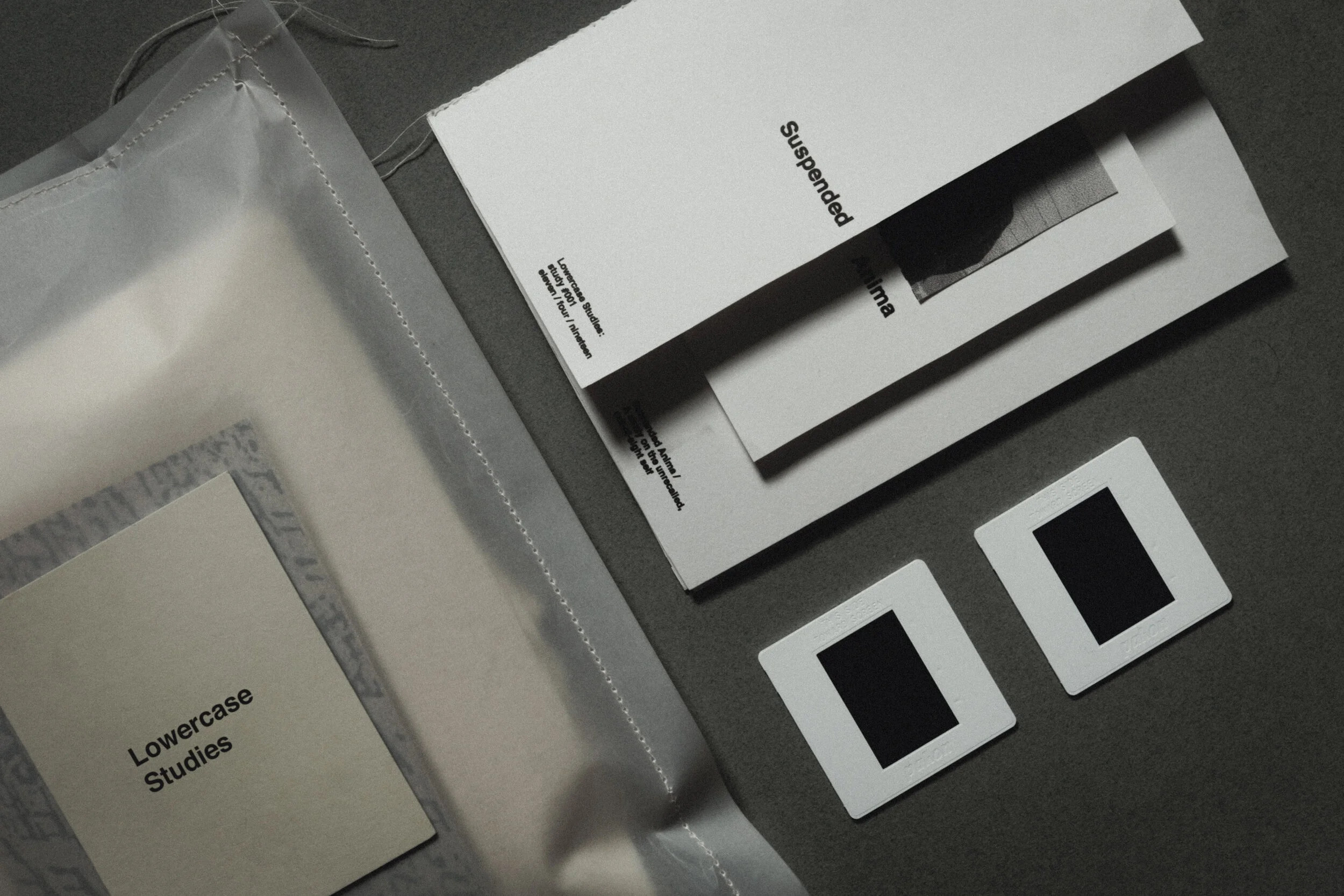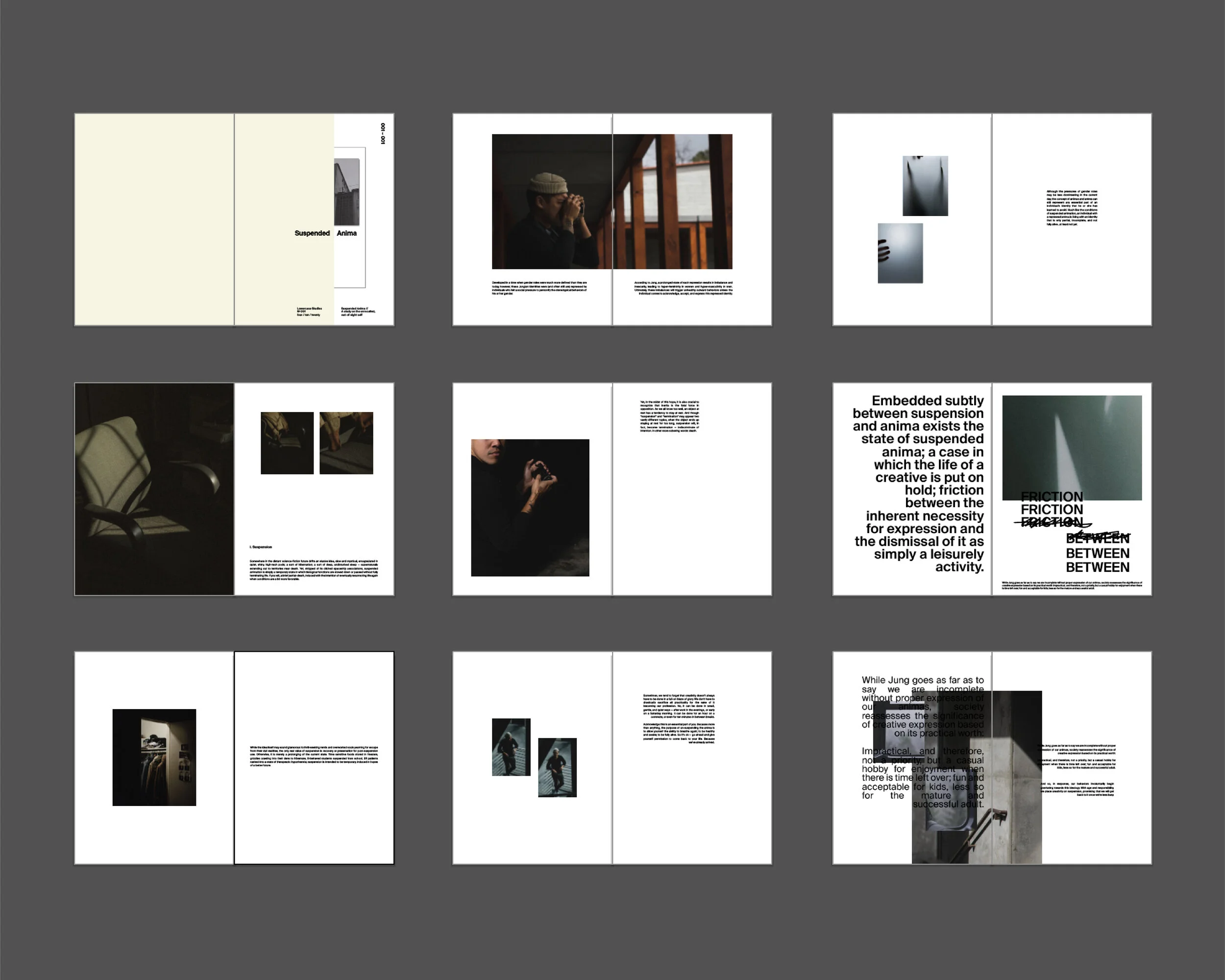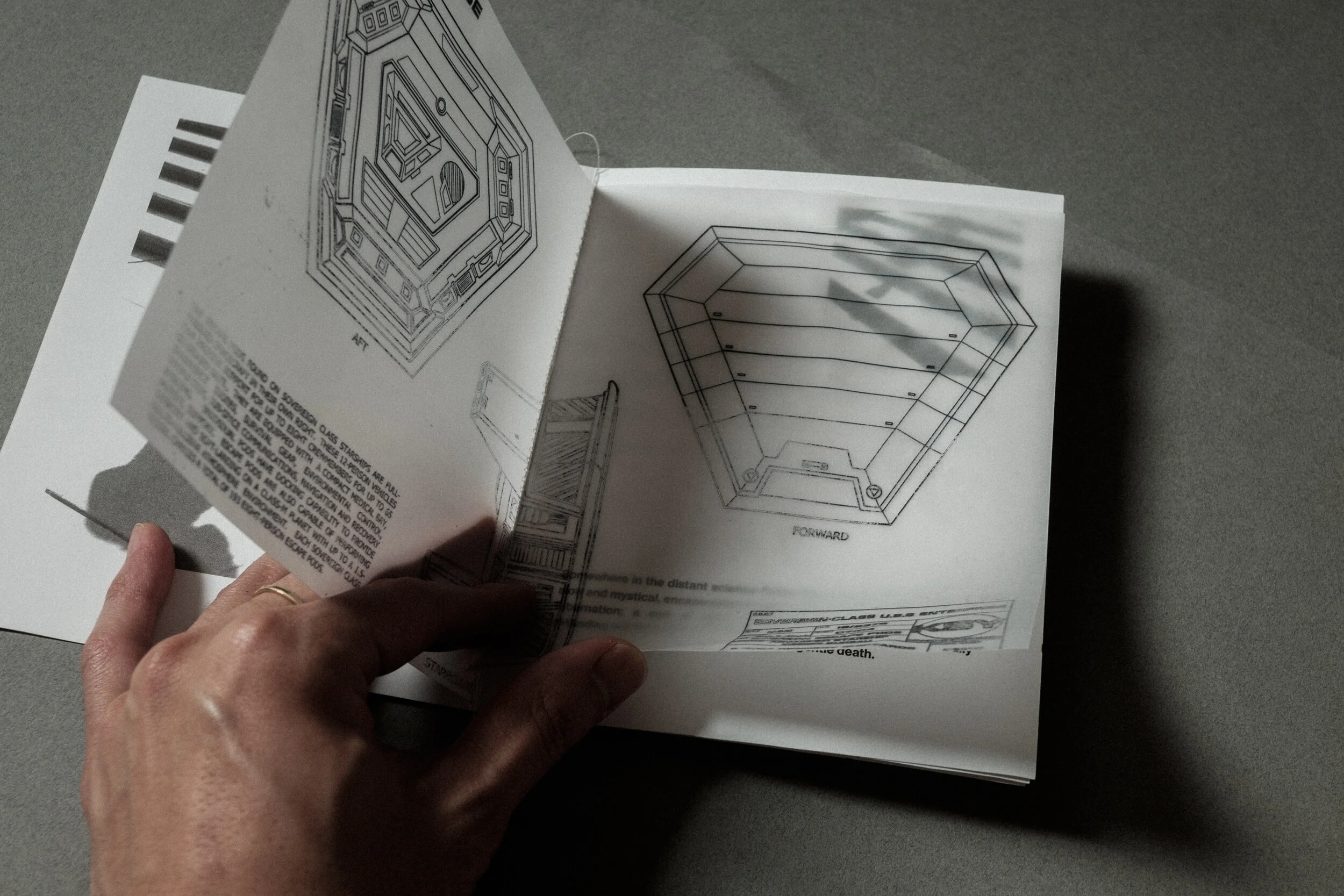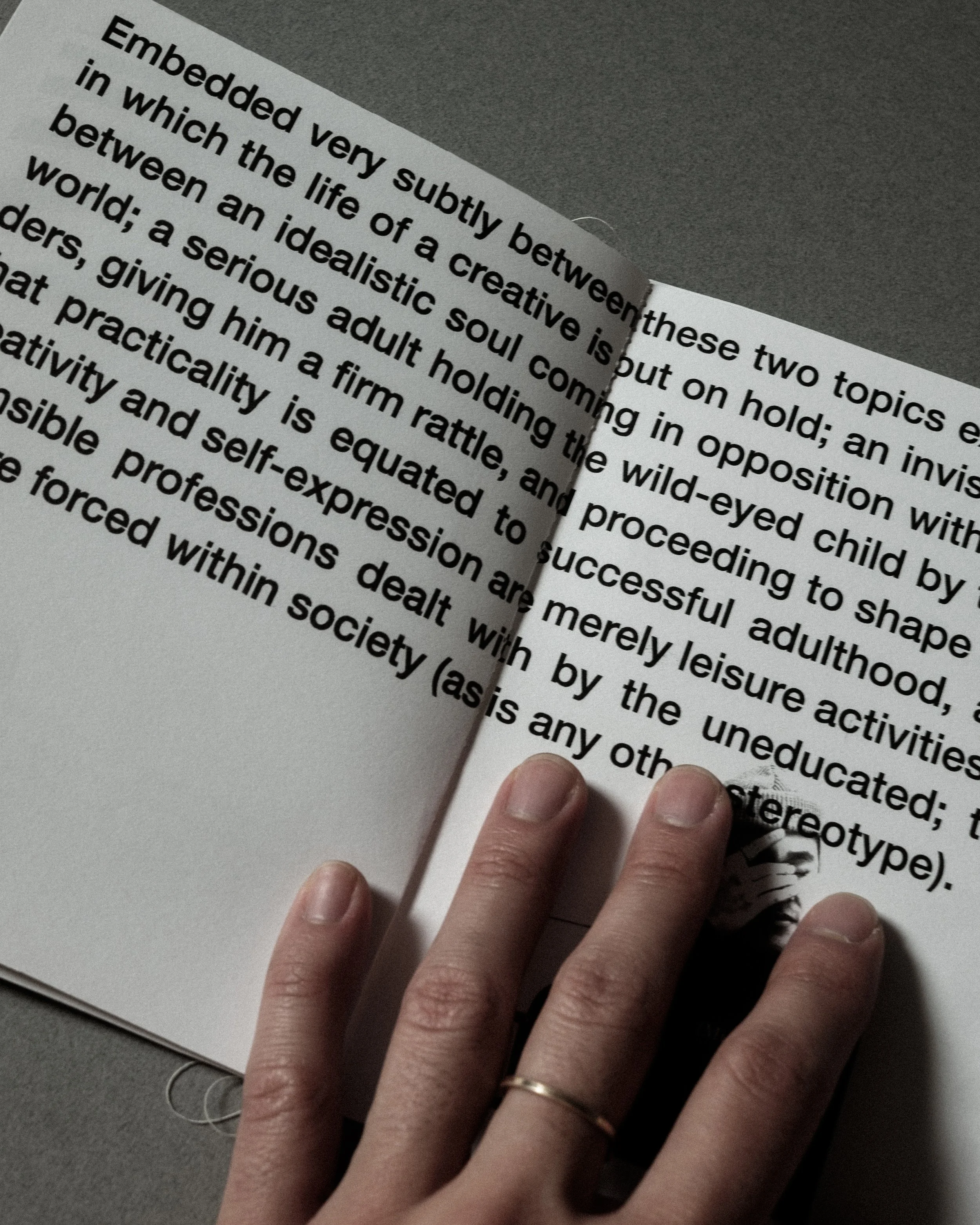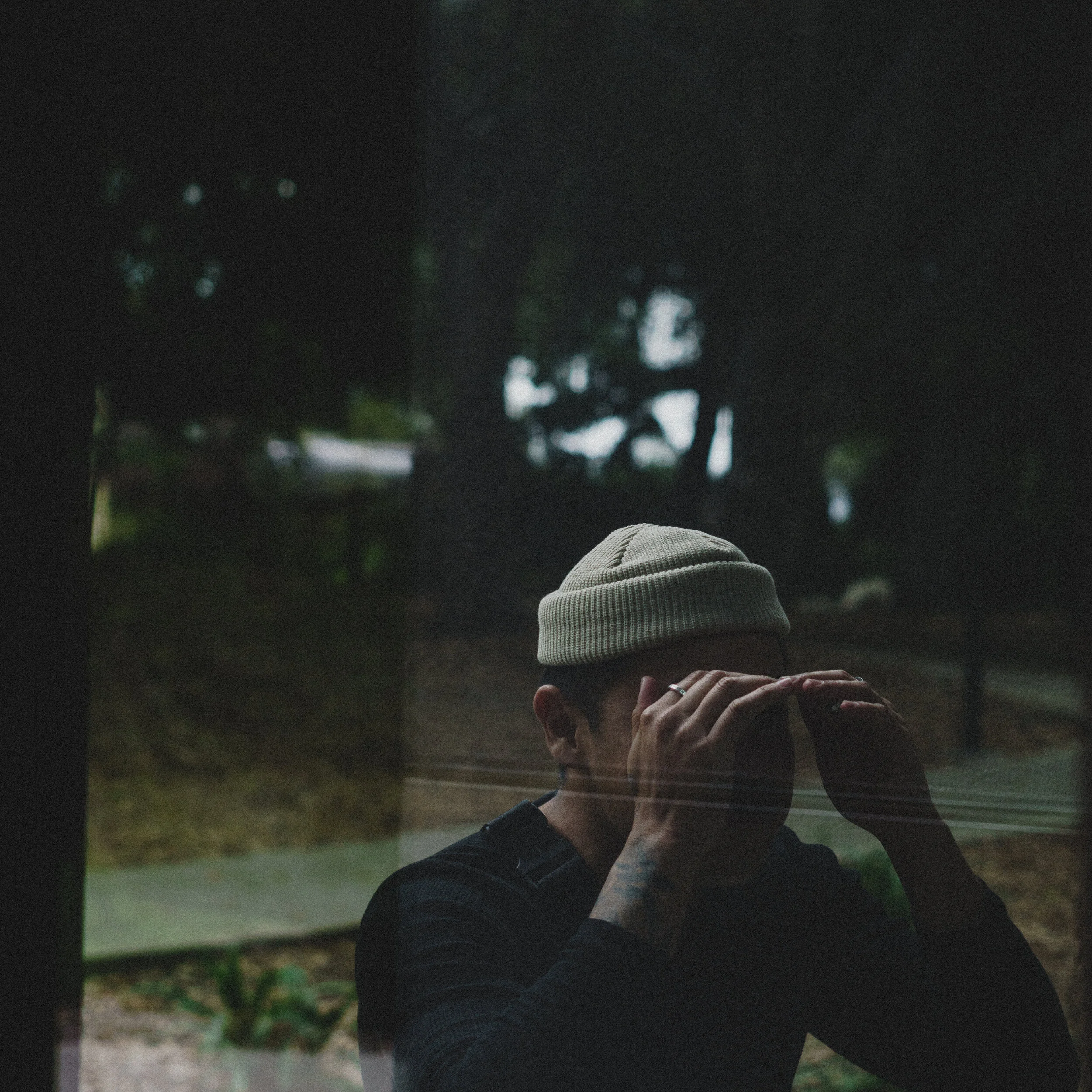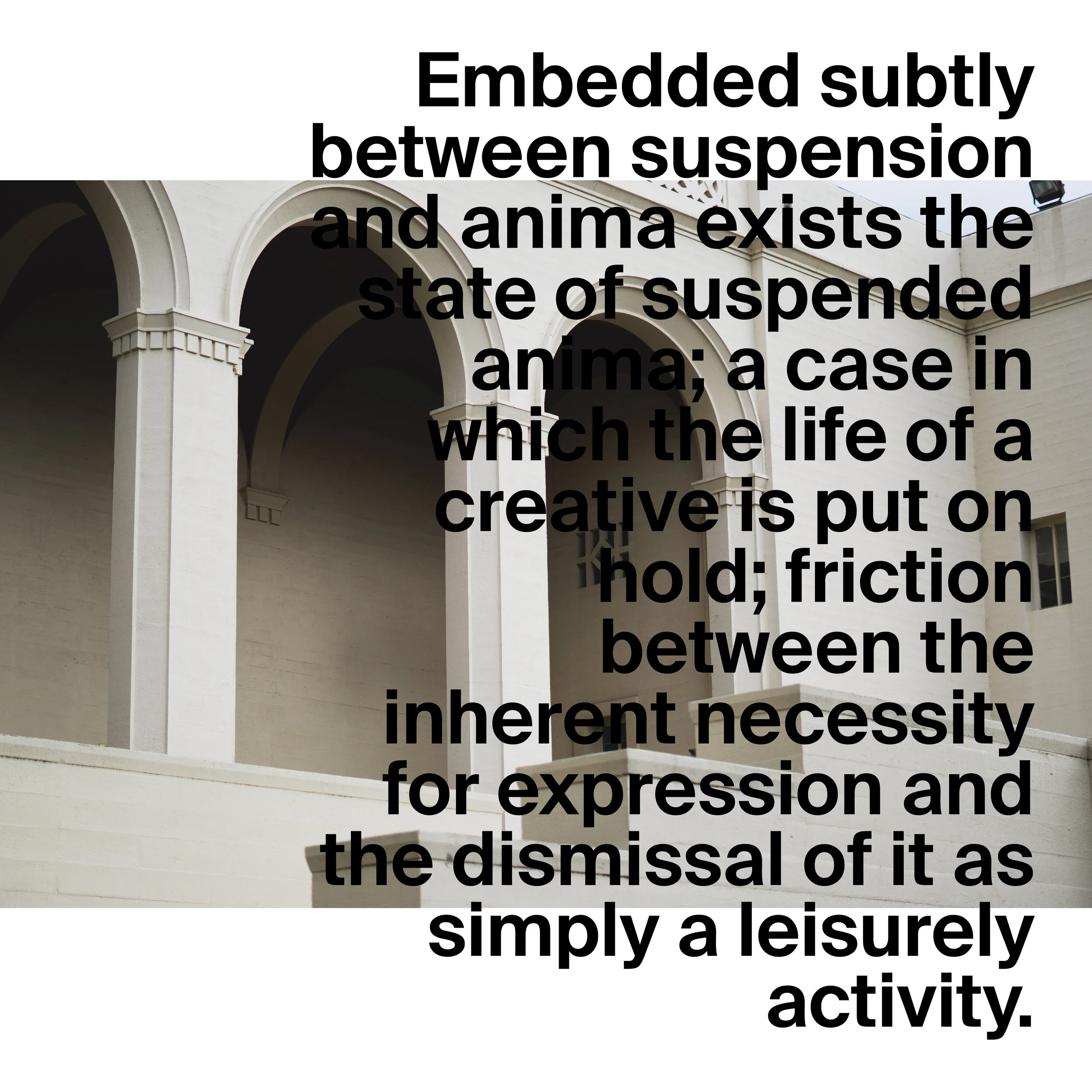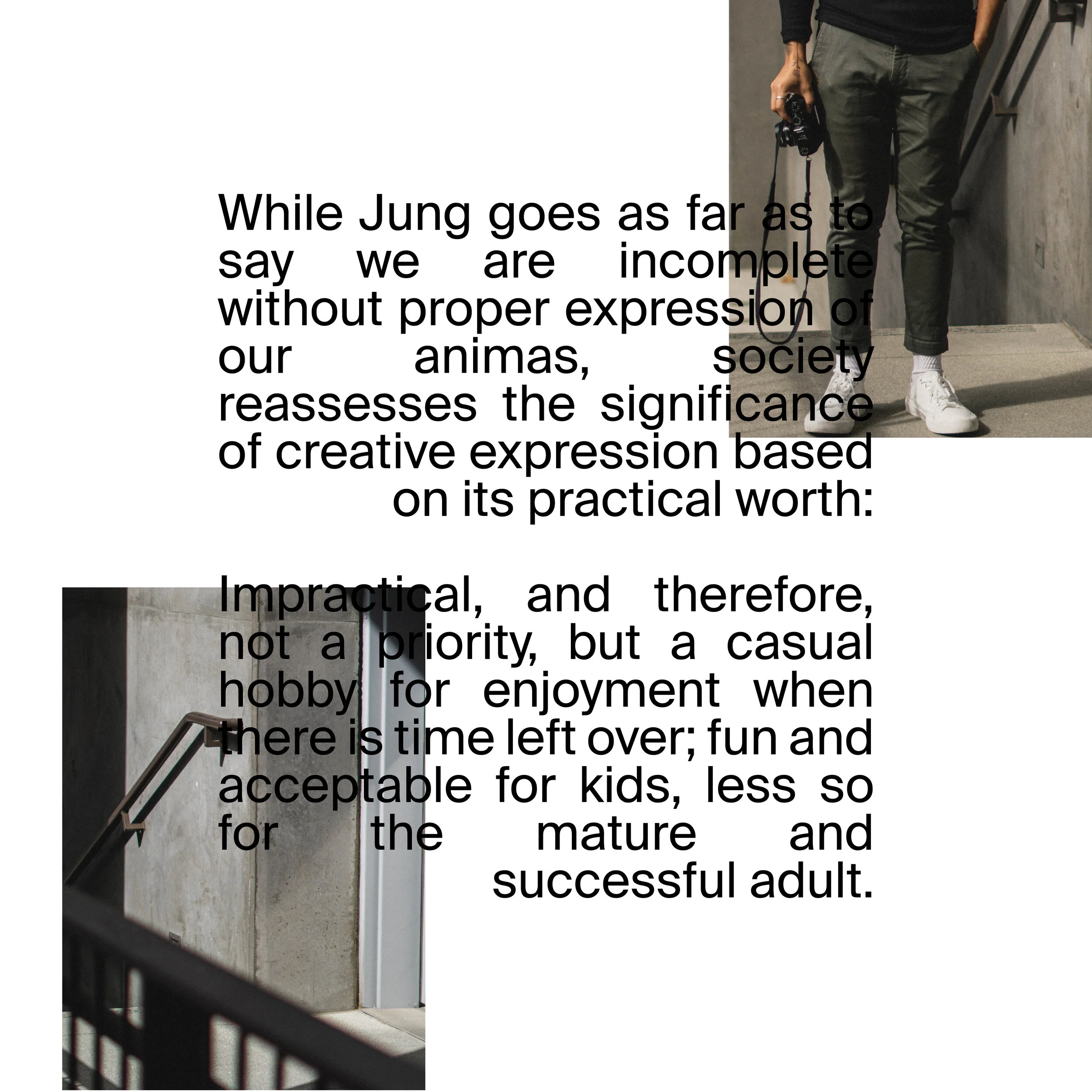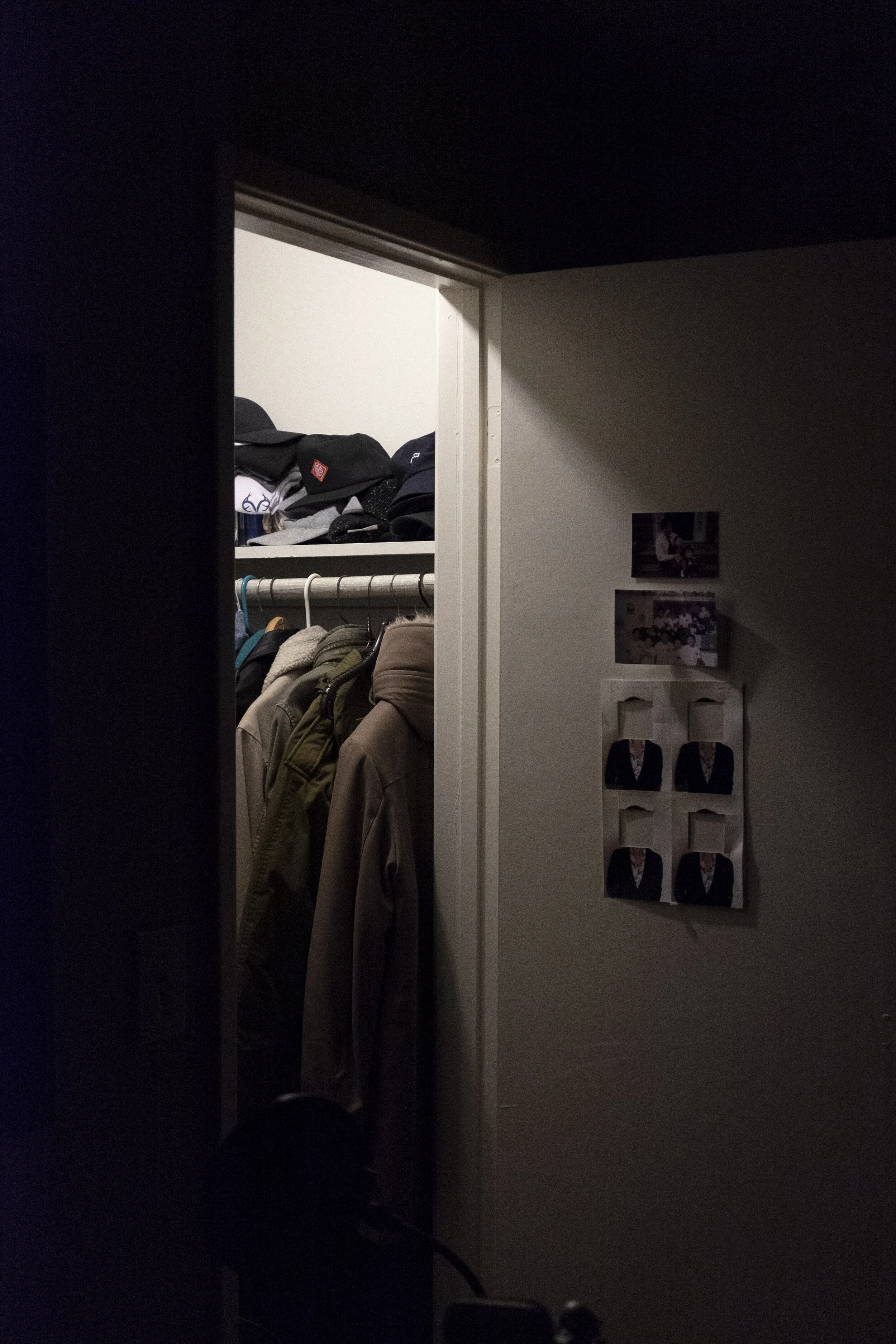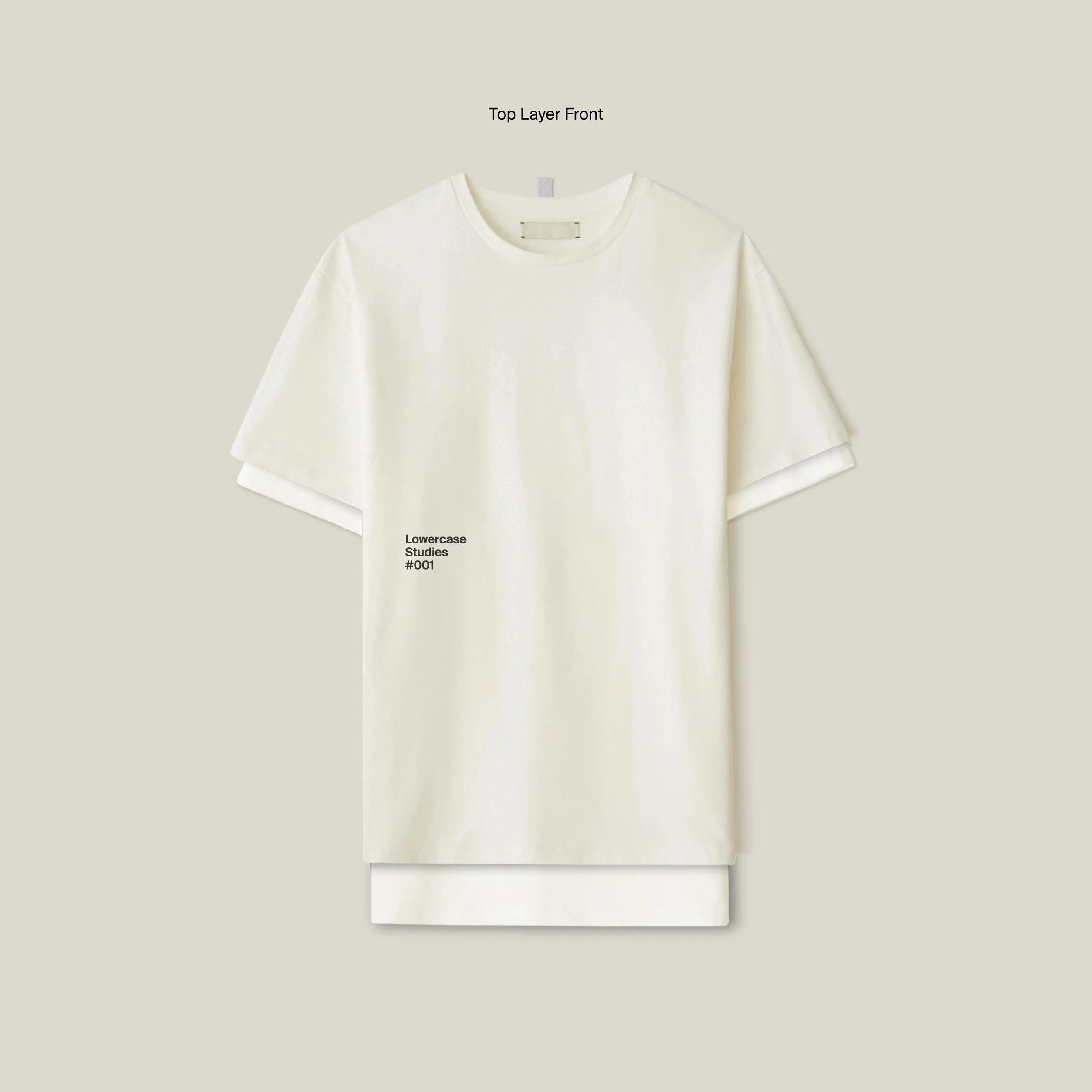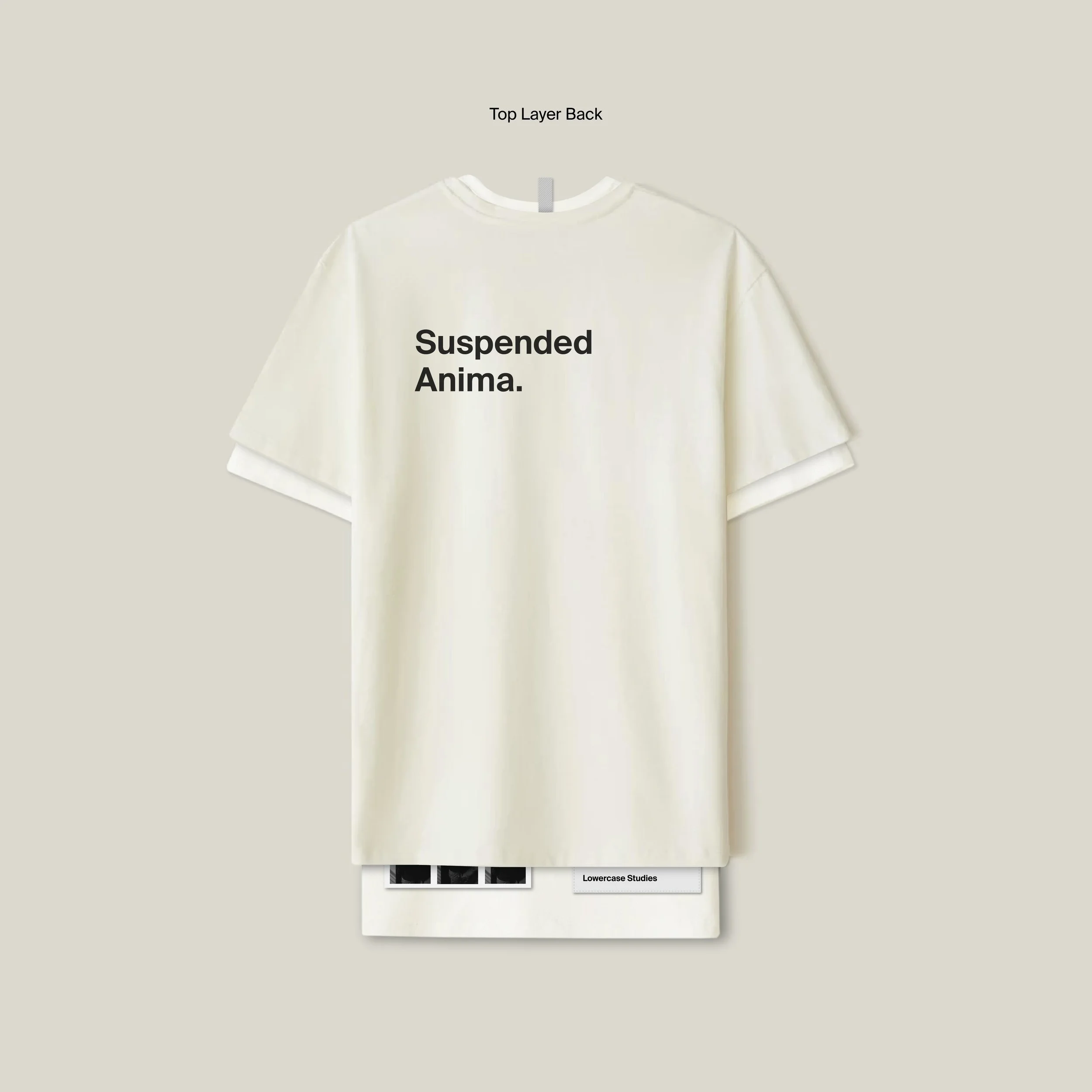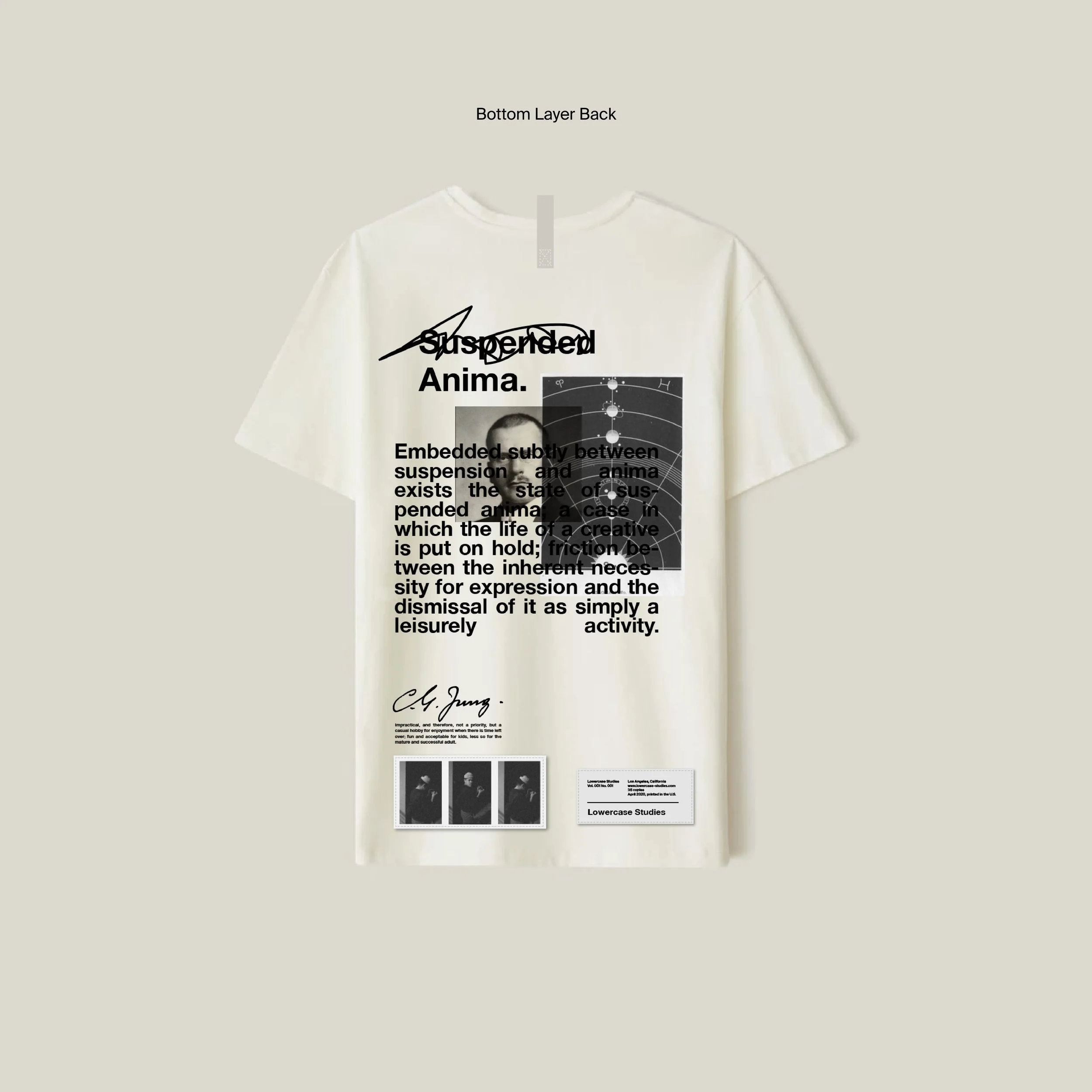Lowercase Studies
The first volume of the Lowercase Studies series: a packaged case study that involves curated mediums designed to present the concept through an integrated experience.
Suspended Anima
This specific study explores the topic of suspension in relation to Carl Jung’s Animus/Anima theory, ultimately defining the state in which artists are suspended from their creative identities. The case study comes in a sealed package containing a photo zine, a double-layer tee, and two 35mm photo slides.
Suspended Anima
A study of the unrecalled, out-of-sight self
I. Suspension
Somewhere in the distant science-fiction future drifts an elusive idea, slow and mystical, encapsulated in quiet, shiny, high-tech pods; a sort of hibernation; a sort of deep, undisturbed sleep — supernaturally extending out to territories near death. Yet, stripped of its cliched spaceship associations, suspended animation is simply a temporary state in which biological functions are slowed down or paused without fully terminating life. If you will, a brief partial-death, induced with the intention of eventually resurrecting life again when conditions are a bit more favorable.
While the idea itself may sound glamorous to thrill-seeking nerds and overworked souls yearning for escape from their dull realities, the only real value of suspension is recovery or preservation for post-suspension use. Otherwise, it is merely a prolonging of the current state. Time sensitive foods stored in freezers, grizzlies crawling into their dens to hibernate, ill-behaved students suspended from school, ER patients rushed into a state of therapeutic hypothermia; suspension is intended to be temporary, induced in hopes of a better future.
Yet, in the midst of this hope, it is also crucial to recognize that inertia is the fatal force in opposition. As we all know too well, an object at rest has a tendency to stay at rest. And though “suspension” and “termination” may appear two vastly different topics, when the object ends up staying at rest for too long, suspension will, in fact, become termination — indiscriminate of intention. In other more sobering words: death.
II. The Animus / Anima
But beyond physical life, we examine a more abstract state dealing with the unconscious. In the 1920’s, Swiss psychologist and psychoanalyst Carl Jung identified the existence of an unconscious identity within all beings: the animus and anima. The animus refers to the unconscious masculine qualities that exist within a woman. It is characterized by rationality, logic, assertiveness, and aggression. Vice-versa, the anima refers to the unconscious feminine qualities within a man; creativity, emotion, romanticism, and softness. In a healthy state, an individual will be capable of expressing a wide range of both of these “masculine” and “feminine” traits.
Developed in a time when gender roles were much more defined than they are today, however, these Jungian identities were (and often still are) repressed by individuals who felt a social pressure to personify the stereotypical behaviors of his or her gender. According to Jung, a prolonged state of such repression results in imbalance and insecurity, leading to hyper-femininity in women and hyper-masculinity in men. Ultimately, these imbalances will trigger unhealthy outward behaviors unless the individual comes to acknowledge, accept, and express this repressed identity.
Although the pressures of gender roles may be less domineering in the current day, the concept of animus and anima can still represent any essential part of an individual’s identity that he or she has learned to avoid. Much like the conditions of suspended animation, an individual with a repressed anima is living with an identity that is only partial, incomplete, and not fully alive…at least not yet.
III. Suspended Anima
Embedded subtly between suspension and anima exists the state of suspended anima; a case in which the life of a creative is put on hold; friction between the inherent necessity for expression and the dismissal of it as simply a leisurely activity.
While Jung goes as far as to say we are incomplete without proper expression of our animas, society reassesses the significance of creative expression based on its practical worth: Impractical, and therefore, not a priority, but a casual hobby for enjoyment when there is time left over; fun and acceptable for kids, less so for the mature and successful adult. And so, in response, our behaviors involuntarily begin gravitating towards this ideology. With age and responsibility, we place creativity on suspension, promising that we will get back to it once we’re less busy.
But we suspend our animas a little longer, still. “I’m gonna get back to it,” we declare to those around us. But then proceed to, again, suspend a bit more, clinging to this hope of a relieved and awakened future. We suspend until inertia slowly sweeps the anima under the rug, until it is out of sight, out of mind; until it has expired. Perhaps we’re in denial. We immerse ourselves with the excessive consumption of art, fashion, music, podcasts, interviews, content — with the expectation that surrounding ourselves in it might somehow allow resurrection of our suspended animas. But a suspension forgotten is no different from termination. A death.
Sometimes, we tend to forget that creativity doesn’t always have to be done in a full-on blaze of glory. We don’t have to drastically sacrifice all practicality for the sake of it becoming our profession. No, it can be done in small, gentle, and quiet ways — after work in the evenings, or early on a Saturday morning. It can be done for an hour on a commute, or even for ten minutes in between breaks.
Acknowledge this is an essential part of you. Because more than anything, the purpose of un-suspending the anima is to allow yourself the ability to breathe again; to be healthy and awake; to be fully alive. So it’s ok — go ahead and give yourself permission to come back to your life. Because we’ve already arrived.
Lowercase Studies
Words by Peter Choi
Vol. 001 No. 001
Los Angeles, California
lowercase-studies.com
35 copies
April 2020, printed in the U.S.
(C) 2020 Lowercase Studies


